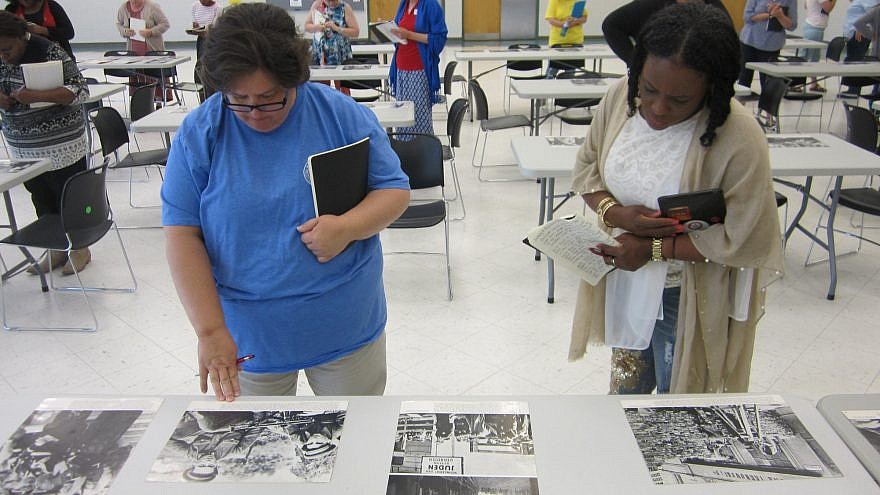In the context of a rising tide of extremism and anti-Semitism in Europe and the United States, more than 500 teachers on both continents will attend 20 TOLI Holocaust seminars this summer, bringing its lessons to their classrooms and communities to confront rising intolerance and extremism.
According to its website, TOLI, the Olga Lengyel Institute for Holocaust Studies and Human Rights, was established to educate students about human rights and social justice through the lens of the Holocaust and other genocides so that such atrocities may never take place again. The seminars “link the lessons of the Holocaust and other genocides to current world events, thereby working with teachers to promote a human-rights and social-justice agenda in their classrooms.”
“Our goal is to provide educators with the resources to teach the Holocaust and become advocates for social change in their classrooms and communities,” said TOLI President Mark Berez.
Likewise, added Sondra Perl, Ph.D., U.S. director of the Olga Lengyel Institute, “It is important for students to know that histories of oppression and discrimination did not only happen overseas or a long time ago, but that human suffering continues take place, and that the United States also has a complicated history.
“Taking on these other subjects in the context of the Holocaust helps to open up questions about history and social justice, and can raise students’ awareness of their ability to take action in the present day,” she told JNS.
The first seminar, which concluded on June 7 in Jackson, Miss., compared the exclusionary policies of Nazi Germany with the Jim Crow laws operating during the same time period in the United States.
That seminar is followed by a seminar in Billings, Mont., with the participation of Native American educators, drawing from the past to consider roles today—perpetuator, ally, bystander—in the face of prejudice and discrimination in and outside schools.
“TOLI’s programs are built on the idea that teachers’ identities and perspectives shape how they approach classroom material,” creating a “model of democratic principles at work where every voice in the room counts,” maintained Perl.
“Based on writing and inquiry, we encourage teachers to think hard not only about the difficult topic of genocide, but also about ways to engage students so that their study of the Holocaust is neither trivialized nor overly traumatic,” she added.
Towards that end, the seminars focus not only on Jewish suffering and death, but also on Jewish life. “We offer opportunities for teachers to learn about Jewish history, traditions and practices, both before and after the Holocaust, so that a rich understanding of Judaism can enlarge their teaching of the Holocaust, focusing on what was lost, and also on what has been reborn and reshaped in the 21st century,” related Perl.
“Finding a middle ground where questions can be asked and honored allows students to think critically,” she continued. “When students recognize that they can play a role in creating a more just society, they often become advocates for action that supports human rights.”
Other seminars, each with its own theme, will be conducted in cities across the United States, with a flagship seminar taking place in New York City, bringing educators from around the country for an intensive 12-day program.
‘Seminar in Poland one of our most important programs’
Internationally, TOLI will hold its first seminar in Warsaw, Poland, in cooperation with the Museum of Polish Jewish History. The program, in the country where the Nazi death camps massacred millions of Jews, will be conducted in frank and free discussion about Nazi genocide, notwithstanding the recent controversy over Poland’s “Holocaust law.”
“Having a seminar in Poland, where over 3 million Jews perished is one of our most important programs,” Harry D. Wall, a member of the board of TOLI, told JNS.
“TOLI has expanded its programs to Europe in response to requests from local Jewish communities and NGOs for resources to confront rising anti-Semitism, intolerance and extremism,” said Wall. “Teaching the Holocaust in the countries where Jewish genocide took place is both a moral imperative to remember the victims and to help prevent further tragedy.”
Wall, a former senior staff director with ADL, noted that TOLI seminars in 2018 will take place in seven countries: Austria, Bulgaria, Greece, Italy, Poland, Portugal and Romania.
He said “each European program will enable teachers, often for the first time, to delve into how the Holocaust impacted their own countries and to help address the disturbing rise of anti-Semitism, racism and ultra-nationalism.”


























